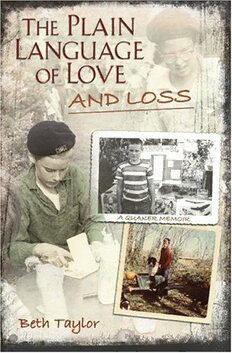
The Plain Language of Love and Loss PDF
160 Pages·2009·2.558 MB·
Most books are stored in the elastic cloud where traffic is expensive. For this reason, we have a limit on daily download.
Preview The Plain Language of Love and Loss
Description:
On November 16, 1965, Beth Taylor s idyllic childhood was shattered at age twelve by the suicide of her older brother Geoff. This memoir reflects on the meaning of death and loss for three generations of Taylor s family and their friends. Touching on the timely issues of bullying, child rearing, and non-conformity, she offers a rare look at growing up Quaker in the tumultuous 1960s that shows the more sober side of the decades counterculture.Beth Taylor's memoir is one of the most tender and moving books I've read in a long time. Written with poise and grace, never falling into self-pity, The Plain Language of Love and Loss will surely touch the heart of anyone who has found the means to salvage a kind of meaning out of great tragedy. This is a book I will not forget.--Tim O'Brien, author of The Things They Carried and In the Lake of the WoodsThe Plain Language of Love and Loss blesses us all with its wisdom and grace. It is a luminous, powerful, and unforgettable book that is ultimately a triumph of the human spirit and a sister's love.--Laura Palmer, author of Shrapnel in the Heart and coauthor of the New York Times bestseller EscapeThis tender narrative is, on the surface, about Quakers and Quakerism in modern America. It is about one family s struggle to align its spiritual strivings with the realities of human limitations and the uncontrollability of circumstance. And it is about some of the ways that the Vietnam War era indelibly marked America. But it is also about much, much more, and anyone who has raised (or is raising) children will empathize here with the poignant collage of tragedy, vulnerability, humdrum, and triumph, as well as the bittersweet canvas of both community and isolation upon which the hues of all our lives are painted.-- Emma Jones Lapsansky-Werner, Professor of History and Curator of the Quaker Collection at Haverford College and coeditor of Quaker Aesthetics: Reflections on a Quaker Ethic in American Design and Consumption, 1720 1920
See more
The list of books you might like
Most books are stored in the elastic cloud where traffic is expensive. For this reason, we have a limit on daily download.
